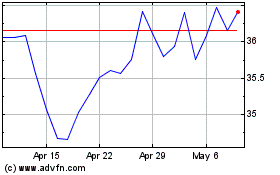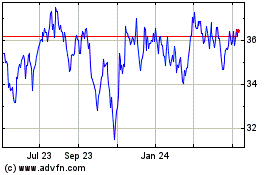By Ryan Dezember | Photographs by Jeff Lautenberger for The Wall Street Journal
A bidding war broke out this winter at a new subdivision north
of Houston. But the prize this time was the entire subdivision, not
just a single suburban house, illustrating the rise of big
investors as a potent new force in the U.S. housing market.
D.R. Horton Inc. built 124 houses in Conroe, Texas, rented them
out and then put the whole community, Amber Pines at Fosters Ridge,
on the block. A Who's Who of investors and home-rental firms
flocked to the December sale. The winning $32 million bid came from
an online property-investing platform, Fundrise LLC, which manages
more than $1 billion on behalf of about 150,000 individuals.
The country's most prolific home builder booked roughly twice
what it typically makes selling houses to the middle class -- an
encouraging debut in the business of selling entire neighborhoods
to investors.
"We certainly wouldn't expect every single-family community we
sell to sell at a 50% gross margin," the builder's finance chief,
Bill Wheat, said at a recent investor conference.
From individuals with smartphones and a few thousand dollars to
pensions and private-equity firms with billions, yield-chasing
investors are snapping up single-family houses to rent out or flip.
They are competing for houses with ordinary Americans, who are
armed with the cheapest mortgage financing ever, and driving up
home prices.
"You now have permanent capital competing with a young couple
trying to buy a house," said John Burns, whose eponymous real
estate consulting firm estimates that in many of the nation's top
markets, roughly one in every five houses sold is bought by someone
who never moves in. "That's going to make U.S. housing permanently
more expensive," he said.
The consulting firm found Houston to be a favorite haunt of
investors who have lately accounted for 24% of home purchases
there. Investors' slice of the housing market grows -- as it does
in other boomtowns, such as Miami, Phoenix and Las Vegas -- among
properties priced below $300,000 and in decent school
districts.
"Limited housing supply, low rates, a global reach for yield,
and what we're calling the institutionalization of real-estate
investors has set the stage for another speculative investor-driven
home price bubble," the firm concluded.
The bubble has room to grow before it bursts, according to John
Burns Real Estate Consulting. But it is inflating fast. The firm
expects home prices to climb 12% this year -- on top of last year's
11% rise -- and increase at least 6% in 2022, a period of
appreciation reminiscent of 2004 and 2005.
That boom was different, fueled by loose lending that enabled
individuals to speculate on home prices by racking up mortgages
they could repay only if home prices kept climbing. The money party
ended a few years later when home prices stopped rising. The
ensuing crash wiped out $11 trillion in U.S. household wealth and
brought the global financial system to the brink of collapse.
Financiers stepped in starting in 2011 and gobbled up foreclosed
homes at steep discounts. They dispatched buyers to courthouse
auctions with duffel bags of cash. Smartphones and tablet computers
-- new then -- enabled them to orchestrate the land grab and manage
tens of thousands of far-flung properties thereafter.
They dominated the market for a few years, accounting for about
a third of sales in some markets and setting a floor for falling
prices. There wasn't much competition. Stung by losses, banks made
it harder for regular home buyers to get a mortgage. Millions of
Americans were underwater, owing more on their mortgages than their
homes were worth, and unable to move.
Home-rental firms, including Invitation Homes Inc. and American
Homes 4 Rent, thrived. Renting suburban homes proved so profitable
that landlords hit the open market and added properties at full
price once foreclosures dried up. Many now build houses explicitly
to rent.
The coronavirus pandemic sparked a race for home-office space
and yards. Occupancy rates reached records and rents are rising
with home prices. The ecosystem of companies that service, finance
and mimic the mega landlords is booming.
Burns counted more than 200 companies and investment firms in
the house hunt: computer-assisted flipper Opendoor Technologies
Inc., money managers including J.P. Morgan Asset Management and
BlackRock Inc., platforms such as Fundrise and Roofstock that buy
and arrange for the management of rentals on behalf of individuals
and builder LGI Homes Inc., which now reports wholesale home sales
to bulk buyers in its quarterly results.
Spring brought a fresh stampede of buyers.
PCCP LLC, which typically invests in apartment buildings and
office towers, said it bought rental-home communities in the
Southeast, the start of a $1 billion pact with Calstrs,
California's $286.9 billion teachers' retirement system.
Home builder Lennar Corp. announced a rental venture with
investment firms including Centerbridge Partners LP and Allianz SE
to which it and potentially other builders will supply more than $4
billion of houses.
Madison Realty Capital moved into rentals with clients that used
to focus on developing apartment buildings and owner-occupied
subdivisions. On Thursday, it closed a $110 million loan on a
project in Los Angeles, where 220 of the nearly 700 home sites are
being sold to investors. The original plans, derailed by the
housing crash, didn't envision any rentals.
"A lot of things that would have been for-sale housing are going
to be for-rent housing," said Josh Zegen, Madison's managing
principal.
Bruce McNeilage began building houses to rent out around
Nashville, Tenn., in 2005. After the housing crash, his Kinloch
Partners expanded into other Southeastern markets, flipping
occupied rentals to bigger investors.
Kinloch was financed mostly by community banks in the cities
where it rehabbed foreclosures and built rentals. These days
Kinloch can borrow far more from Walker & Dunlop Inc., a
commercial real estate lender forging into suburban rentals. Mr.
McNeilage's problem is that others are bidding up houses and
lots.
"I am boxed out," he said. "There's too many people chasing
things and they're willing to overpay. It's silly money right
now."
Write to Ryan Dezember at ryan.dezember@wsj.com
(END) Dow Jones Newswires
April 04, 2021 10:14 ET (14:14 GMT)
Copyright (c) 2021 Dow Jones & Company, Inc.
American Homes 4 Rent (NYSE:AMH)
Historical Stock Chart
From Mar 2024 to Apr 2024

American Homes 4 Rent (NYSE:AMH)
Historical Stock Chart
From Apr 2023 to Apr 2024
